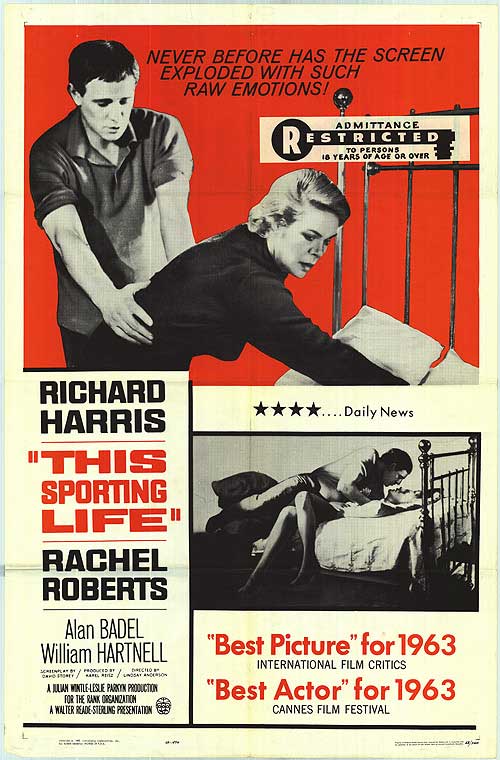-- This a short introductory talk I gave before a special screening of This Sporting Life at the wonderful Hyde Park Picture House in Leeds on 4 September. The screening was sponsored by Rugby League Cares.
"I’ll start with the best line in the film. Frank Machin, played by Richard Harris, meets the wife of the club chairman after his first match.
‘You’re the new star’ she says. He looks at her, ‘We don’t have stars in our game. That’s soccer.’ ‘So what do you have?’ she asks. ‘Just people like me’ he replies.
Which pretty much sums up what rugby league is all about.
It’s 49 years since the film of This Sporting Life was released. The first words you hear are spoken by Great Britain loose-forward Ken Traill. You’ll see Belle Vue and the great Trinity players of the 1960s. You’ll see the Trinity beating Wigan 5-4 in the 1962 cup quarter-final. Thrum Hall is used for the scenes outside of the ground. And there’s another ground shown too - tell me at the end if you spot it.
So there’s some great footage of rugby league history.
But the film is far from perfect. It hasn’t aged as well other kitchen sink dramas like Saturday Night and Sunday Morning or The Loneliness of the Long Distance Runner. Listen to the accents - God knows where Richard Harris thinks he is from but it’s certainly not Wakefield. Rachel Roberts doesn’t even attempt to change her Welsh accent. And generally Harris spends too much time trying to out-do Marlon Brando in A Streetcar Named Desire.
It also presents a very one-dimensional view of rugby league. The game is portrayed as nothing but violent and aggressive - there’s no sign of the artistry, the skills, the athleticism, the or creativity that also make the game. But this is partly because Storey was still angry about the way he was treated as a young ‘A’ team player at Leeds.
His dad was a miner and he’d been brought up with the game, but he won a scholarship to Queen Elizabeth Grammar in Wakefield and then went to art school in London. You can imagine how he had his leg pulled in the dressing room. ‘I was permanently belligerent’ he later said. But his later play The Changing Room and his later novels presented the game in much more nuanced and rounded way.
But in reality this isn’t a film about rugby league. Lindsay Anderson, the director, uses the game to explain the doomed love story that is at the heart of the film and the book - which is essentially about a relationship between an older woman and a younger man.
Frank Machin isn’t a rebel like Albert Finney in Saturday Night and Sunday Morning or Tom Courtenay in The Loneliness of the Long-Distance Runner. Instead, he’s a man trapped in a world and a relationship that he cannot control - and he lashes out with violence.
At its heart, This Sporting Life is a film about those two great English obsessions: Sex and Class. Ultimately it is a story about class and what it means to be a man and how to behave as a man - and because of its unique history, no sport illustrates these artistic questions better than rugby league... as we are about to see."
